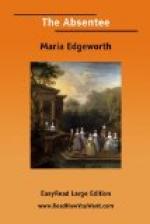was changed; and if his heart swelled, it swelled
no more with pleasurable sensations, for instantly
he found himself surrounded and attacked by a swarm
of beggars and harpies, with strange figures and stranger
tones: some craving his charity, some snatching
away his luggage, and at the same time bidding him
’never trouble himself,’ and ‘never
fear.’ A scramble in the boat and on shore
for bags and parcels began, and an amphibious fight
betwixt men, who had one foot on sea and one on land,
was seen; and long and loud the battle of trunks and
portmanteaus raged! The vanquished departed, clinching
their empty hands at their opponents, and swearing
inextinguishable hatred; while the smiling victors
stood at ease, each grasping his booty—bag,
basket, parcel, or portmanteau: ’And, your
honour, where will these go?—Where
will We carry ’em all to, for your honour?’
was now the question. Without waiting for an
answer, most of the goods were carried at the discretion
of the porters to the custom-house, where, to his
lordship’s astonishment, after this scene of
confusion, he found that he had lost nothing but his
patience; all his goods were safe, and a few TINPENNIES
made his officious porters happy men and boys; blessings
were showered upon his honour, and he was left in peace
at an excellent hotel in —Street, Dublin.
He rested, refreshed himself, recovered his good-humour,
and walked into the coffee-house, where he found several
officers—English, Irish, and Scotch.
One English officer, a very gentleman-like, sensible-looking
man, of middle age, was sitting reading a little pamphlet,
when Lord Colambre entered; he looked up from time
to time, and in a few minutes rose and joined the conversation;
it turned upon the beauties and defects of the city
of Dublin. Sir James Brooke, for that was the
name of the gentleman, showed one of his brother officers
the book which he had been reading, observing that,
in his opinion, it contained one of the best views
of Dublin which he had ever seen, evidently drawn
by the hand of a master, though in a slight, playful,
and ironical style: it was ‘an intercepted
letter from china.’ The
conversation extended from Dublin to various parts
of Ireland, with all which Sir James Brooke showed
that he was well acquainted. Observing that this
conversation was particularly interesting to Lord Colambre,
and quickly perceiving that he was speaking to one
not ignorant of books, Sir James spoke of different
representations and misrepresentations of Ireland.
In answer to Lord Colambre’s inquiries, he named
the works which had afforded him most satisfaction;
and with discriminative, not superficial celerity,
touched on all ancient and modern authors, from Spenser
and Davies to Young and Beaufort. Lord Colambre
became anxious to cultivate the acquaintance of a gentleman
who appeared so able and willing to afford him information.
Sir James Brooke, on his part, was flattered by this




